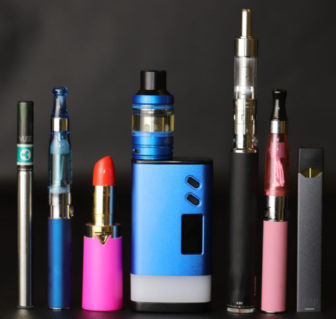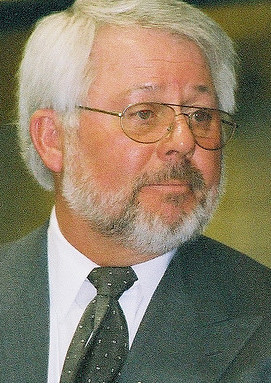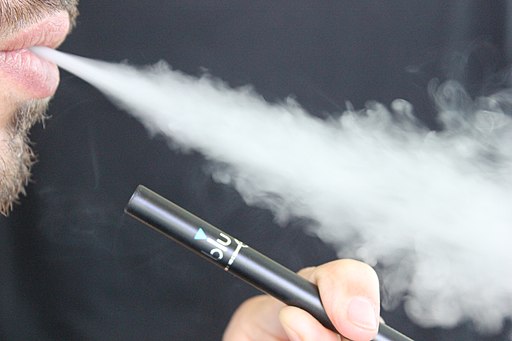@BryanRenbaum
[email protected]
The American Heart Association said Tuesday that recommendations in a report newly released by Maryland Comptroller Peter Franchot’s office aimed at curbing underage access to electronic smoking devices (ESDs) are good but do not go far enough because they do not call for an outright ban of flavored nicotine products.
“We need to remove all flavored products because they are appealing to kids,” Laura Hale, the AHA’s director of government relations, told MarylandReporter.com in an interview on Tuesday. “We need to remove all flavored products because they are appealing to kids. And it doesn’t matter if that’s in a refill they can buy in a vape shop or if it’s a refill they buy at the corner store…. All of these products are addictive. All of these products are unregulated. And leaving any of them on the market is leaving an opportunity for youth to have access to them. And this is why we really need the comprehensive removal.”

Various types of electronic smoking devices (California Department of Public Health photo)
Hale said her organization backs legislation the General Assembly is considering that would ban the sale of all flavored tobacco products in the state.
“That’s why HB3 and SB233 are so essential this year in their entirety.”
Hale singled out one recommendation in the report for praise. It would amend the Maryland’s Clean Indoor Air Quality Act so that emissions from ESDs are considered pollutants.
The e-Facts Task Force report was released on Monday. “Electronic Smoking Devices: A Safer Path Forward” recommends 12 policy and regulatory changes for the state. Most of the recommendations would require approval by the General Assembly. The report calls on lawmakers to act.
The recommendations include:
- ending internet and mail-order sales of ESDs
- limiting the sale of flavored liquids and refillable accessories to vape shops
- limiting entry and sales in vape shops to persons age 21 and over
- requiring manufacturers of ESDs to provide pre-sale disclosure of ingredients contained in the product
- bringing Maryland into compliance with federal law, which prohibits the sale of nicotine and tobacco products to anyone under age 21. State law exempts military members who are on active duty and present identification as proof of that fact.
Susan O’Brien, spokesperson for the Office of the Maryland Comptroller, defended the report.
“The 12 recommendations are sensible and practical to help ensure these products are safe for public consumption and for keeping vaping products out of the hands of kids. Those were the task force’s priorities going in and Comptroller Franchot is proud of the work that the stakeholders did on this front.
“Had the American Heart Association accepted our invitation to participate, rather than criticizing from the sidelines, the organization would have known that the task force specifically deferred to the Maryland General Assembly on the issue of an outright product ban, precisely because there are bills under consideration that would do this. Whatever legislation is passed, we are ready to enforce. If not passed, these recommendations, as well as Comptroller Franchot’s ban announced last week on the sale of most flavored disposable e-cigarettes, will go a very long way to keep children and families safe.”

Jeffrey Wigand (Photo by Melvin “Buddy” Baker/ Creative Commons)
Former tobacco scientist-turned-corporate-whistleblower and anti-smoking advocate Jeffrey Wigand, said ESDs are more dangerous than regular cigarettes because the devices are often found in “the hands of seventh- and eighth-graders.” He said the “onset of illness with smoking was 15 to 20 years” whereas with ESDs “the onset of illness and death” can occur within “a couple of years.”
Wigand said many of the deaths that have been attributed to ESDs were caused by people messing “with the contents.”
“There should be no way with something to make your own cocktail,” he said.
Wigand said if the product is “water-soluble” the potential exists for users to add drugs such as heroin and valium to the device.
A spokesperson for Altria, the parent company of tobacco giant Phillip Morris, declined requests by MarylandReporter.com for comment about the report.




Ms. Laura Hale from the American Heart Association is either lying or misinformed. Nicotine e-liquid is regulated and has been since 08/08/2016. Also, flavored nicotine e-liquid has shown to help adults quit combustible cigarettes. Ms. Hale’s company (AHA) also had to retract a study the health lobbying organization published under the pretenses that the study may have been based on misleading data: https://www.vice.com/en_us/article/v74zny/a-major-study-that-fueled-national-vape-panic-has-been-retracted
There are many peer-reviewed articles stating that e-cigs are a better options to cigarettes and that flavors are the driving incentive for adults who use this method to quit cigarettes. The comptroller also acknowledge himself that these were helpful for adults.
The American Heart Association, and Ms. Hale has an obvious interest for funding. Maryland Reporter allowed falsities to be reported and did not even realize they were being hood-winked. I understand that Ms. Hale using her title as a government relations specialist made the newspaper believe that she knew what she was talking about. Please check your resources so you can deliver your mission: to properly inform the public with factual information of current events.
If Ms. Hale and her company was really concerned, they would be working with responsible vape shop owners to establish regulations that are a win for both adults and teens. Instead, misguided attempts to remove flavored vapor products from the hands of adults will open a big black market in Maryland, and send others back to cigarettes.
Vitamin E Acetate is a component in skin cream and is not to be used internally… So, you can imagine what skin cream/lotion will do to the tiny aveoli ( air sacks ) in the lungs…
“Former tobacco scientist-turned-corporate-whistleblower and anti-smoking advocate Dr. Jeffrey Wigand, said ESDs are more dangerous than regular cigarettes because the devices are often found in “the hands of seventh- and eighth-graders.” He said the “onset of illness with smoking was 15 to 20 years” whereas with ESDs “the onset of illness and death” can occur within “a couple of years.””
ESDs are absolutely NOT more dangerous than traditional cigarettes. Even the biggest opposition scientists, like Dr. Glantz, have yet to have a study that shows ESDs as MORE dangerous than cigarettes- every one of them shows reduced risk, which is the exact point. EVALI was not caused by legal nicotine vaping products, but by vitamin E acetate used to cut illegal THC carts from black market sources. Blaming legal nicotine ESDs for that is like blaming medical needles for the heroin crisis.
ESDs are about risk and harm reduction. No, they aren’t 100% safe, but neither are nicotine patches or snus. The UK even sells them in hospitals as alternatives to smoking because every one of their studies has shown that these products are 95% safer than cigarettes and have almost double the smoking cessation rate of other cessation devices. ESDs are meant for adults looking for a safer alternative to smoking, and maybe even a way to slowly taper off nicotine on their terms. Yes, the teen use problem is something that needs to be addressed, but we do that by addressing teen use and parental responsibility, not by punishing adults who aren’t involved. Most teens get their products from websites outside of the US or gas stations and convenience stores. Address those sources FIRST. And for God’s sake, don’t lie about the risks of ESDs.